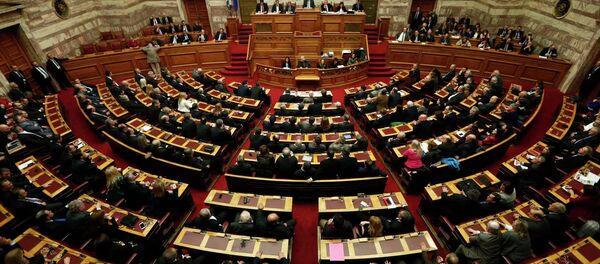"Both Syriza and its coalition partner, ANEL (Independent Greeks), wish to signal that Greece will not slavishly follow the Western or EU foreign policy line. Syriza's history and culture have been influenced by its Communist past to some extent. ANEL is keen to show its pro-Russian and pro-Putin feelings," Kevin Featherstone, Professor of Contemporary Greek Studies and Professor of European Politics at the London School of Economics and Political Science, told Sputnik Wednesday.
Featherstone did stress, however, that Greece depends on the European Union in terms of debt easing that the country urgently needs.
The professor warned that "very soon Athens will no doubt realize that asking the eurozone for help outweighs its interests with Russia". Nevertheless, according to Feathersone, if the new Greek government survives, Athens will likely strengthen its ties with Moscow.
"The new foreign minister is more friendly to Russia than the previous ministers (and the previous governments). This is so for several other members of the government," Hatzis told Sputnik Wednesday, stressing that "the EU behaved ill-manneredly" and the Greek government used the chance to emphasize its more "independent" attitude with regard to the European Union.
The professor, added, however, that Greece's reaction to the European Union's call for more anti-Russia sanction "should not be construed as a major shift in policy" because Greece needs to maintain an EU-friendly stance in order to improve its economic situation.
"Greek economy and especially Greek banks are in such a bad shape that a schism with European Union will lead to economic disaster. This means that if the new government decides to reach a compromise with our partners for debt relief, it will be extremely difficult to pursue a foreign policy which is not in alignment with our partners," Hatzis explained.
The Greek Deputy Foreign Minister said Wednesday that the country is against sanctions imposed on Russia by the West, as they damage the Greek economy.
Earlier in January, the Incofruit-Hellas association of Greek enterprises exporting fruit, vegetables and juices said in a report that the country's farmers have lost $46.7 million in fruit and vegetable exports due to the one-year food ban introduced by Russia in August 2014. The ban was a response to sanctions imposed on Russia earlier by the United States, the European Union and their allies that are accusing Russia of aggravating the situation in southeastern Ukraine.



